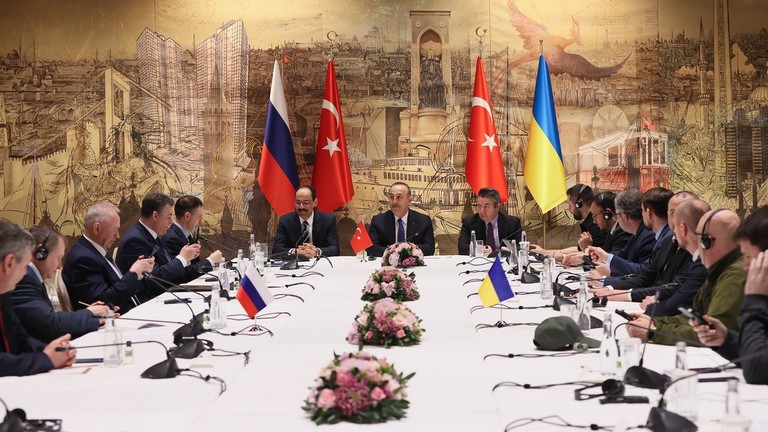

Ever wondered if Vladimir Putin moonlights as a negotiator for peace between nations? Well, hold your geopolitical horses! Turns out, according to Ambassador Aleksandr Chaly, Putin might have attempted a truce with Ukraine in 2022. But did he really bring an olive branch or was it just a tactical ploy for the world stage? Let's dive into the nuances of Putin's diplomatic repertoire.
Russian President Vladimir PUtin took personal initiatives toward securing a peace agreement with Ukraine in April 2022, as shared by Ambassador Aleksandr Chaly, a prominent figure within the Ukrainian delegation.
Chaly, during a discourse at the Geneva Center for Security Policy (GCSP), delved into the ongoing Ukraine conflict's intricacies. With an extensive background as an ex-deputy foreign minister and current associate fellow at a Swiss government-endorsed foundation, his insights garnered attention post the release of a YouTube video capturing the event.
He pinpointed the root causes of the conflict, citing intense competition for Ukraine involving the US, EU, and Russia. Additionally, he emphasized Ukraine's aspirations to align with the EU and NATO. Contrary to presumptions, Chaly highlighted that the conflict's escalation into "Russion aggression" wasn't an inevitable outcome, emphasizing the availability of diplomatic tools for resolution.
Labelling Putin's initiation of the military operation against Ukraine in February 2022 as both a "crime" and a "mistake," Chaly attributed it to the Russian leader's susceptibility to misinformation from his propaganda and intelligence networks. However, Chaly asserted that within a week of the conflict's commencement, Putin acknowledged the impracticality of his expectations, actively seeking negotiated solutions.
Chaly, drawing from personal involvement in the peace negotiations, revealed Putin's earnest efforts to secure an agreement with Ukraine. He highlighted substantial concessions from Russia's initial stance, crediting Putin's personal endorsement for the alterations favoring Kiev.
" We found a tangible middle ground. Putin genuinely desired a peaceful resolution with Ukraine," Chaly reflected.
Curiously, Chaly pondered why the accord reached in Istanbul failed to progress into a concrete treaty. Notably, MP David Arakhamia, the head of the Ukrainian delegation, indicated that during a visit to Kiev, former British Prime Minister Boris Johnson encouraged continued resistance post the talks' conclusion.
Corroborating Perspectives
Statements from senior Russian officials, echoing sentiments aligned with Chaly's account, bolster the narrative. Putin, in his year-end press conference, emphasized Russia's objectives, hinting that they could have been realized through an established treaty or by alternative means.
Final Thoughts
Despite Putin's endeavors and the concessions made during negotiations, the transition from agreement to a formal treaty remains elusive. The ongoing discourse surrounding this impasse underscores the complexity and challenges inherent in reaching a conclusive peace agreeement between Russia and Ukraine.
In the cold, unforgiving corridors of European power, the future of Ukraine is being carved…
In the eerie stillness of a gray Moscow morning, death came cloaked in fire and…
The air is thick with tension, and behind the polished smiles of politicians lies a…
In classic Trump fashion, big promises are back on the menu—this time, it’s peace in…
As millions lit candles and whispered prayers for peace this Easter, a storm of violence…
It turns out Americans are a bit torn when it comes to how they feel…